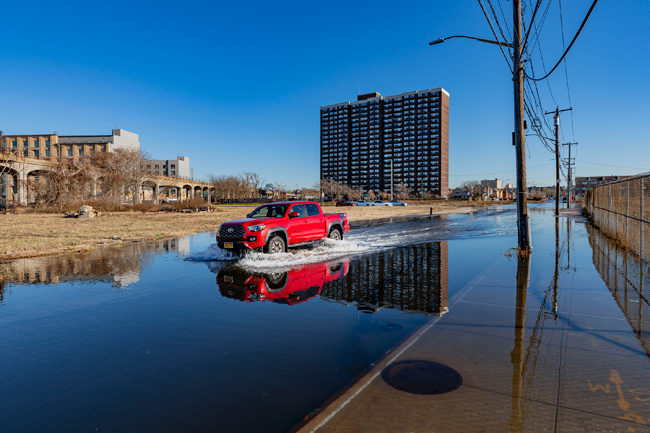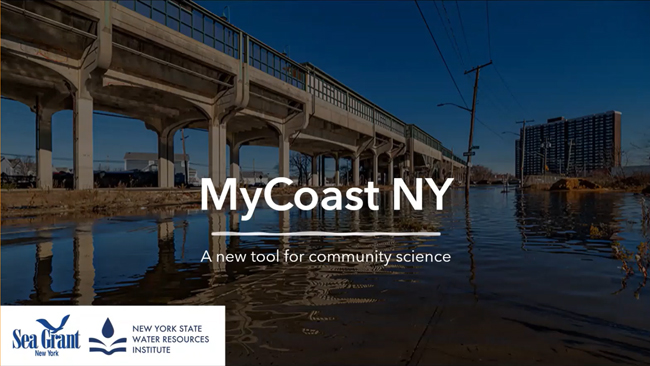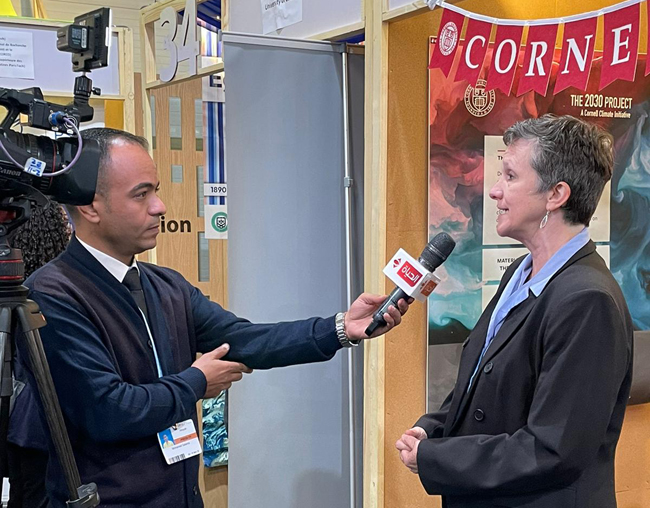— By Chris Gonzales, Freelance Science Writer, New York Sea Grant
Contact:
Kathy Bunting-Howarth, NYSG's Associate Director, E: keb264@cornell.edu, P: 607-255-2832
Ithaca, NY, January 13, 2023 - The negative effects of climate change appear all too often in the news media: Across the globe, we’re seeing rising temperatures, rising sea levels, and an increase of disruptive and dangerous storms and wildfires. Damage to buildings, roads, and bridges—and displacement of people—is already happening. But at the recent U.N. climate summit, a representative from New York Sea Grant (NYSG) brought strategies that could help communities worldwide adapt and thrive.
This past November, Kathy Bunting-Howarth, associate director of NYSG, as one of 23 Cornell University delegates who attended the 2022 United Nations Climate Change Conference (COP27) in Egypt. She participated on a panel about moving sustainability from the margins to the mainstream, as well as delivered a talk about the role of universities in the discussions about ocean and climate.
“At the sustainability panel, I emphasized the importance of boundary organizations, like Sea Grant, that connect science with communities,” said Bunting-Howarth.
(L-R) Cornell students Katherine Cornett (College of Engineering) and Eva Fenningdorf (College of Arts and Sciences) joined NYSG's Bunting-Howarth for "Oceans, Climate, and Universities: Sharing Knowledge and Solutions", a COP27 talk on the role of universities in the discussions about ocean and climate.
COP27 deal
U.N. climate talks ended in November 2022 with a deal to pay poor nations for damage from climate change. It would establish a fund to help pay for disasters brought about by an unstable climate. In addition, the final deal reiterates the goal set by the 2015 Paris agreement to keep overall global warming from rising more than 1.5 degrees Celsius compared to the pre-industrial era. From a blue (or ocean-conscious) perspective, the final decision further acknowledges the role of the ocean and strengthens the mandate for the annual Ocean-Climate Dialogue—a formal discussion that takes place at the U.N. summit about the oceans and climate change.
Climate crisis and the oceans
According to science, even a 1.5-degree-Celsius rise in global temperature stands to do much harm to ocean life, as well as intensify coastal storms and inland droughts. In addition, it will lead to the loss of plant and animal habitat. These changes could have disastrous effects on aquatic life, fisheries, and ocean reefs, not to mention forests and other land-based habitats. The need to study the links between the climate and ocean health is more important than ever.
A network of Stony Brook University scientists, with funding from NYSG, have been on the leading edge of climate-focused research. They’ve found, for example, a localized solution for ocean acidification—a problem linked to climate change—in a common seaweed, kelp. The deployment of kelp on an oyster farm combats ocean acidification in the vicinity and therefore helps protect the bivalves grown there.
These scientists are also growing multiple types of seaweed in Long Island Sound, in near-shore locations in Connecticut and New York. Their goal: improve water quality while expanding the industry for cultivated seaweed, oysters, and mussels in the region. Another study offers continued reasons for hope: Areas of the ocean with abundant seagrass could provide refuge for shellfish in future climate change scenarios.
NYSG's Kathy Bunting-Howarth also participated in a panel about shifting sustainability from the margins to the mainstream. She first speaks around 36 min 22 sec into the 1 hr 37 min talk above.
In her talk, Bunting-Howarth warned about the dangers of ocean acidification, as oceans absorb carbon from the atmosphere, making it harder for mollusks and crustaceans to absorb that same carbon for their own life processes. The oceans are a large sink for carbon and heat, but their ability to do so is under threat. She talked about the ways universities can support ocean observation, develop new tools and best practices, and reduce the overall threat of climate change.
“My general focus while attending the COP was networking in order to learn from others,” she continued. “I shared our work on climate, coasts, and the ocean as we empower communities to not only adapt to climate change but explore ways of sequestering carbon.”
Highlights from Sea Grant's climate efforts
Bunting-Howarth gave the example of a research project where scientists were tagging fish to learn about migration patterns. In another, researchers analyzed food webs as aquatic rapidly-spreading species changed ecosystems. Or how toxic algae and harmful algal blooms (HABs) will grow and potentially become more dangerous under climate change.

A truck plows down a flooded city street near the shore in Far Rockaway, Queens. This photo was taken on January 4, 2022 during a “sunny day” high tide flood event. Credit: Giles Ashford, NYC Community Flood Watch Project
New York City’s coastal communities are already seeing an increase in nuisance flooding on sunny days, when unusually large tides bring water into low-lying coastal neighborhoods. The Community Flood Watch and Living with Water projects were designed to validate forecasts as well as provide information on how flooding will impact community well-being and livelihood.
With publishing the journal article “Living with Water,” the goal was to better engage local knowledge into adaptation planning. “Frequent ‘sunny-day’ flooding will likely increase over time,” said Bunting-Howarth, one of the article's co-authors. “Learning how people currently adapt to these events can shape future resilience planning.”

Download This: MyCoast NY is a new app that can provide you with a way to locally document increasing flood risk and uncertainty.
“People are moving out of areas at risk due to climate change flooding,” she said. “In our MyCoast New York program, citizen scientists collect photos of coastal flooding and storm damage, and share them in an online app.”
The Cornell Climate Stewards Program, for another example, teaches community members about climate impacts and mitigation, giving them knowledge and skills to help local governments take actions to respond to climate change effects.
“There are many social and practical benefits of university-based efforts: Supporting students, conducting research, and providing funding opportunities,” she added.
Recalling a few personal highlights from the trip, she mentioned meeting Winston Thompson, the ambassador to the U.S. from Fiji. She also spoke with Sefanaia Nawadra, director general of the Secretariat of the Pacific Regional Environment Programme (SPREP). In another highlight, Bunting-Howarth was interviewed by Egyptian television.

New Yok Sea Grant Associate Director Kathy Bunting-Howarth (at right) interviewed by a Egyptian television reporter at COP27. Credit: John McKain
Sea Grant climate efforts worth knowing
NYSG has a long track record of funding research on climate change. Briefly, here are a few additional examples:
• Assessing Climate-Driven Migration in the U.S. has been a Sea Grant focus in a handful of regions. In September 2022, NYSG produced an eight-page publication prompting consideration of how such factors as rising temperatures and precipitation, extreme weather events, sea level rise, and flooding that influence human migration, displacement, and planned relocation may impact the Great Lakes region of the U.S. "This factsheet is a step toward mobilizing the resources that can be applied to better understand climate change impacts on people and how communities can plan and prepare for increased populations in an environmentally, economically, and socially adaptable manner," says Bunting-Howarth.
A year prior, Sea Grant facilitated and co-hosted a virtual workshop with participants from Maine to Virginia. The goals were to feature the current state of knowledge on climate-induced human mobility, provide local/regional case studies, and address the unique needs of underserved and underrepresented coastal communities.
• NYSG's Coastal Resilience Extension Specialist, a CCE employee, reports that flood sensors are providing accurate and precise information about coastal flooding to support resilience building across all five boroughs of New York City.
Takeaways
NYSG is facilitating research, student learning, and the development of best practices around the issue of climate and the oceans. At the COP27 climate summit in Egypt, NYSG not only provided real-world examples of tactics for climate adaptation, but also strategies related to the need for collaborative relationships between universities and our communities, at home and worldwide. Though it may not make the national headlines like the COP27 agreement itself, local efforts are still a big deal.
“At the summit, I shared our lessons learned, and our approaches,” Bunting-Howarth continued. “Upon returning home, I reflected that these large international agreements don’t need to seem overwhelming and irrelevant to our lives. Individual actions and behaviors matter.”
More Info: New York Sea Grant
New York Sea Grant (NYSG), a cooperative program of Cornell University
and the State University of New York (SUNY), is one of 34 university-based
programs under the National Oceanic and Atmospheric Administration’s
National Sea Grant College Program.
Since 1971, NYSG has represented a statewide network of integrated
research, education and extension services promoting coastal community
economic vitality, environmental sustainability and citizen awareness
and understanding about the State’s marine and Great Lakes resources.
Through NYSG’s efforts, the combined talents of university scientists
and extension specialists help develop and transfer science-based
information to many coastal user groups—businesses and industries,
federal, state and local government decision-makers and agency managers,
educators, the media and the interested public.
The program maintains Great Lakes offices at Cornell University, SUNY
Buffalo, SUNY Oswego and the Wayne County Cooperative Extension office
in Newark. In the State's marine waters, NYSG has offices at Stony Brook
University in Long Island, Brooklyn College and Cornell Cooperative
Extension in NYC and Kingston in the Hudson Valley.
For updates on Sea Grant activities: www.nyseagrant.org has RSS, Facebook, Twitter, Instagram, and YouTube links. NYSG offers a free e-list sign up via www.nyseagrant.org/nycoastlines for its flagship publication, NY Coastlines/Currents, which is published quarterly.